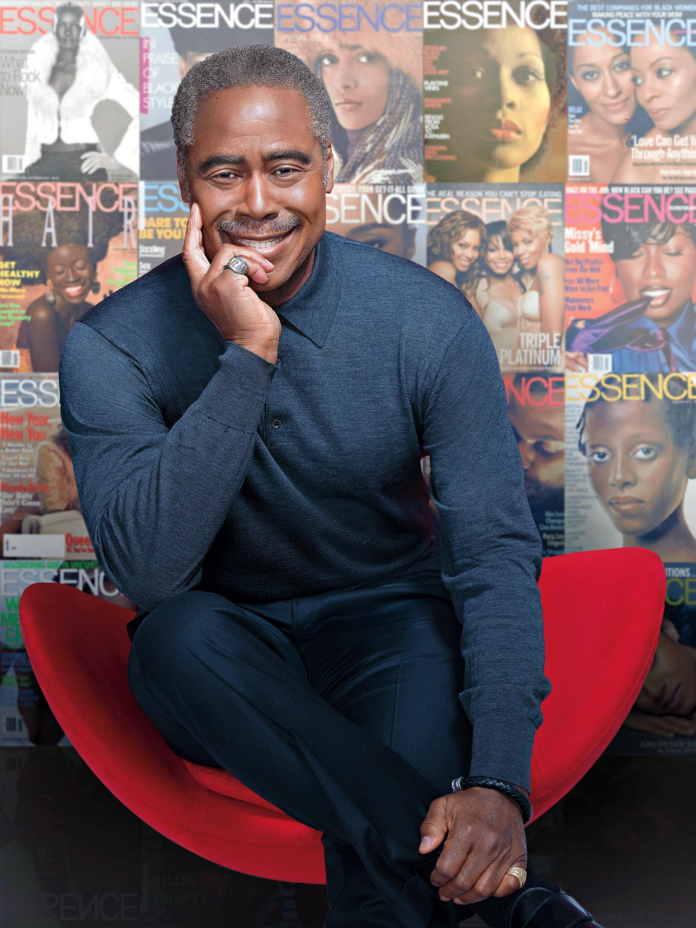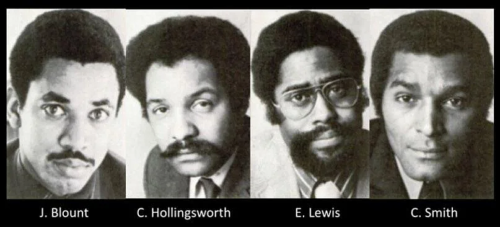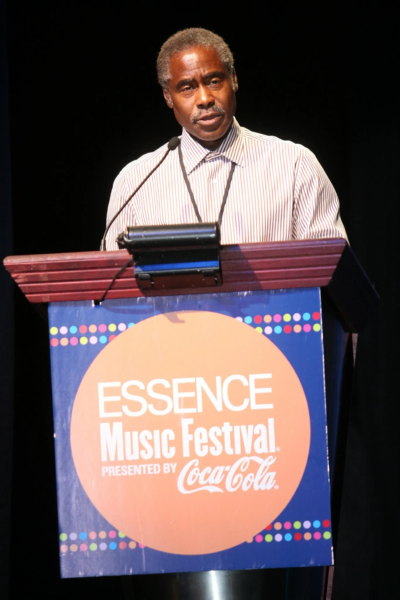Edward Lewis was one of four co-founders of the cultural compass for Black women, Essence Magazine, which launched in May 1970. The publication was not just another magazine, but according to a New York Times article, Essence became “the preeminent voice for Black women.” I had the privilege of being a part of this groundbreaking, first-ever endeavor and was blessed to have witnessed the awe-inspiring and brilliant mind of Ed Lewis.
Ed’s journey began in the South Bronx. The ever-industrious youth worked as a cashier at a grocery store after school. This is where perhaps his affinity for finance germinated. During his high school years, Ed, who attended DeWitt Clinton, was a star fullback on the football team. Upon graduating high school, Ed earned a football scholarship to the University of New Mexico where he was one of 12 Black students. He received a B.A. degree in political science, and an M.A. in political science and international relations. Ed later graduated from Harvard University’s Small Business Management Program.
After college, Ed was hired as an administrative analyst for the City Manager’s Office in Albuquerque, New Mexico. Ed’s career path then led him to a financial analyst role at First National City Bank in New York City. An invitation to an investment business meeting sponsored by Shearson, Hammill & Co. led to the exploration of a groundbreaking concept, a Black women’s magazine, that forever changed Black print’s cultural landscape.
Originally titled Sapphire Magazine, Ed and his three partners (Jonathan Blount, Cecil Hollingsworth, and Clarence O. Smith) aimed to have the title reflect the gem-like beauty and resilience of Black women. However, after a female staffer reminded them that Sapphire was a despicable Black female character on the Amos ‘n’ Andy television show of the 50s, and that readers might be likely to associate the magazine with the demoralizing and stereotypical characters on the show, they then changed the magazine title to Essence.
The monthly magazine saw notable success and by 1975 had amassed around $3.5 million in advertisements. Its January 1977 issue had about 550,000 issues circulated. However, power struggles between the founders and creative directors ensued in the mid-70s and when the turbulence had quieted, only Ed and his partner, Clarence O. Smith, were left at the helm of the company.
Over the years, Essence became a must-read archive of Black women’s lives; it struck a perfect balance between the aspirational and the attainable. The magazine encouraged Black women to dream of more, and to explore ideas and places, beyond their neighborhoods. It spotlighted powerful Black women and glorified their triumphs.
The publishing powerhouse also consistently found innovative approaches to spotlight Black empowerment by adding to its company’s holdings as evidenced by The Essence Awards, the television show, the yearly famed Music Festival, and merchandising. Becoming a global brand was also a testament to Ed’s exceptional leadership. Over his 35-year career at Essence, the man who was once described as possessing a ‘soft-spoken calm and courtly elegance’ had defied the status quo, fearlessly embraced bolder visions, and took Essence to new heights of unimaginable successes.
In 2005, Ed stepped down as Chairman and CEO of Essence after he engineered a partnership with Time Inc. The deal resulted in the diversified, multimillion-dollar corporation no longer being solely Black-owned.
Richard Parsons, former CEO of Time Warner once said about the formidable Essence publisher, ‘Ed doesn’t just make things happen, he’s the last man standing. That’s a function of grit, perseverance, character, resilience, integrity, hard work, and a little bit of luck.’
In 2014, Ed published his memoir: The Man from Essence: Creating a Magazine for Black Women. In 2023, he was featured in the five-part docuseries, Time of Essence, which highlighted how the magazine had influenced Black culture in the United States over the last 50 years.
In fall 2017, Essence returned to Black ownership. The publication was acquired by Richelieu Dennis, founder of Shea Moisture. Essence Ventures was born, ensuring that Ed’s legacy – a dynamic pillar of Black women’s history that provided crucial representation — would continue.
Ed’s appreciation for Black women stemmed from the love he had for the four most powerful female influences in his life–mother Jewell Lewis Clark, grandmother Mary Spencer Carrington, aunt Madeline Berryman, and cousin Barbara Johns. Essence, the magazine many of us 50BOLDers grew up loving was born out of love and celebration for the Black woman.
The eternally youthful, dapper, and still very handsome former publishing giant, splits his time between New York City and California. Ed is married to his beautiful wife of 33 years, Carolyn Wright-Lewis. The octogenarian is still going strong by continuing to immerse himself in business ventures and philanthropic work with no plans of hanging up his oh-so-stylish fedora.
Ed spoke candidly to 50BOLD about his life, business acumen, and legacy, and I was all ears!
50BOLD: You grew up in the South Bronx, attended DeWitt Clinton High School, and was a star on their football team. What was it like growing up in the South Bronx?
Ed: Last year I went back to visit my old neighborhood which is on 169th St. and Washington Ave. I lived in a housing apartment on the 14th floor and can remember my mother climbing up all those 14 flights with groceries.
50BOLD: Whew! Wait a minute! You didn’t have an elevator?
Ed: No, having an elevator in the building would have been an absolute luxury back in those days.
50BOLD: But 14 flights of stairs! Too crazy to even imagine!
Ed: I know! I think back to my mother and father and how they went up and down those stairs for many years. It gives me pause to know where I’ve come from, and where I am now. Where we lived was mostly in a Jewish neighborhood.
The other evening, I was at Al Sharpton’s National Action Network dinner. One of the honorees at the dinner was the Senior Vice President of Strategic Initiatives at Montefiore Hospital, and the former Bronx Borough President, Rubén Díaz, Jr.; we had not seen each other in a long time. He said, “Ed, do you remember, your name is inscribed on a lamppost sign by the Bronx courthouse?”
50BOLD: Why, how did that happen?
Ed: My name is inscribed on a lamppost sign because I grew up in the Bronx and also because of my achievements. He wanted to shine my name on the lamppost in front of the county courthouse on 161st St. and the Grand Concourse. We had a wonderful dedication and when it took place, my family was there to witness it. It was great!
50BOLD: What did you want to be before starting Essence?
Ed: I went to the University of New Mexico and majored in political science and international relations. I also went to Georgetown Law School. I really thought I was going to be a big time lawyer but law was not meant for me. I flunked out during my first year at Georgetown.
I went to work at Citibank, it was then called First National City Bank. While working there, I was invited by a man I called the Godfather of Essence, Russell Goings. He held a meeting on how to start a business and 25 of us showed up. I attended the meeting and that’s where the idea of Essence was born. But even before the meeting, within my own family, my mother who was one of nine, and her mother, my grandmother, were my real introduction to the power of a Black women.
In 1927, when my grandmother’s husband was killed in a factory accident, she was given a settlement of $5,000. She bought 110 acres of land outside of Prince Edward County Virginia. That’s where she raised all her children, grandchildren. I am an only child. From age 5 to nearly 14 years old, my mother put me on a Greyhound bus to visit my grandparents during summer vacations.
My grandmother remarried. She married a man who had five children. She had nine children, together they had 14. My grandmother made such a powerful impact, not only on her children, but grandchildren as well. She had the unusual ability to connect with all of us individually. We were to hold family reunions on the family compound after my grandmother’s passing to bring the family together.
My grandmother died in 1971 and requested, that we continue the tradition of bringing the family together every fourth weekend in August. This coming August will be 68 years that we’ve continued to bring the family together.
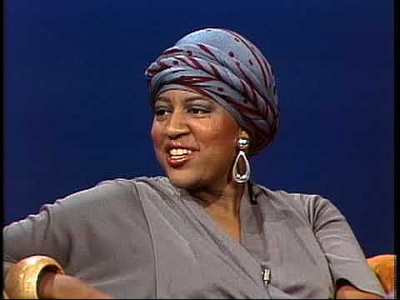
50OLD: I know your mother Jewell Lewis Clark was dear to you. How did she influence your life?
Ed: Oh, my God! I can’t say enough about my mother who was an incredible woman! She wanted me to live by four commandments. My mother wanted me to be a proud Black man, take care of my family, and get a good education. And the last commandment she’d always say to me, “I always want you to try to do the right thing. Just try,” she’d say. “I know you are a man of the world, and you have lots of choices, but I just want you to try.”
The idea of getting involved in starting a magazine that would celebrate the beauty and intelligence of Black women also stems from my being involved with all my aunts in Virginia and Washington, D.C. I was also inspired by my first cousin, Barbara Johns, who in 1951, was fed up with the poor conditions of her all-Black school compared to the all-white school nearby. She organized the entire student body, 450 classmates, to protest the school in Farmville, Virginia. The boycott resulted in Thurgood Marshall and other NAACP lawyers coming to Farmville to visit the inspiring 16-year-old young lady who organized it all.
The protest that Barbara organized led to a court case that became one of five cases that the U.S. Supreme Court reviewed in Brown v. Board of Education of Topeka when it declared school segregation unconstitutional.
50BOLD: That is all so amazing!
Ed: If you go to Richmond, you will see a statue of my cousin inside the State Capitol building. And early next year, if you go to Washington, DC, to the National Statuary Hall where the Confederate General Robert E. Lee’s statue stands, my cousin Barbara Johns will replace his statue.
50BOLD: That says a lot about your DNA.
Ed: No doubt about it! Another person who influenced my life greatly would be my uncle, Tracy Spencer, who owned a logging business. My uncle talked to me about having control over your life, having control over destiny. And the only way to achieve that was to have something of your own. It was he who actually planted entrepreneurial seeds in me during my childhood. I observed my uncle as he ran his own business and was inspired to someday follow suit.
50BOLD: When reflecting on your reign over Essence magazine, Essence Music Festival, Essence TV, Essence merchandising, is there any one thing you might have done differently?
Ed: You know, I never even really thought about that. The way things evolved — wanting some different partners (laughs).
50BOLD: (laughs) Now, that’s funny!
Ed: And they more than likely would feel the same about me. I would have wanted to spend more money on promoting the magazine in our early years. That was always a problem.
When I started Essence there were four partners. In fact, when I first wrote my book, I was going to name it The Last Man Standing. But I changed that to The Man from Essence: Creating a Magazine for Black Women.
I reached out to all of my former partners and asked them to be interviewed for the book because they all were there when we first started in ’68 to ’70. But they each declined. I said, ‘Okay, I’m going to tell the story as I see it, coming from my perspective.’
When the Essence docuseries aired, and Karen, I don’t know if…
50BOLD: OMG, of course, I saw the docuseries, Time of Essence; it was phenomenal!
Ed: I tried to reach out and others tried to reach out as well to my former partners to get them to participate. But they refused again, except for Jonathan Blount. I said, ‘Okay!’
Yes, would I have done something differently? I would have chosen different partners!
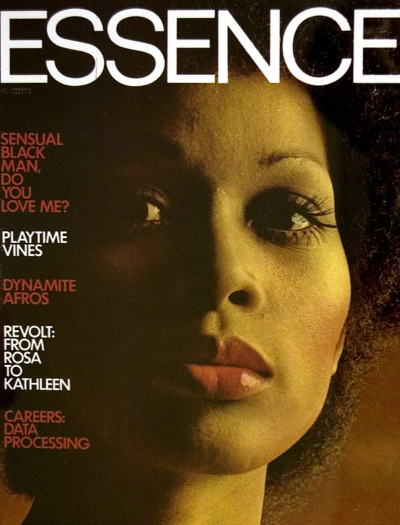
50BOLD: You are very honest. I found your book, The Man from Essence to be very eye-opening. You are very candid. What motivated you to be so revealing in the book and what inspired you to write it?
Ed: It is important. We have so many stories to be told. I wanted to memorialize how this magazine came into being and the dynamics about it. I wanted Black women to know that there were four Black men who created a magazine for Black women because we treasured them.
I also wanted to provide some information about how I lived the American dream of bringing a minority company into the world and then, being able to sell it to a majority company. I thought I could provide some nuggets of information that might be helpful to people who read the book. The other motivating issue behind my writing the book is that people, as you know Karen, thought Susan Taylor started the magazine. I did not want people to believe that Susan was the founder of Essence magazine. I wanted people to know that four Black men came together to start Essence.
In 2005, I had dinner with the then Secretary of State Condoleezza Rice. She asked me, ‘Ed, how did you get involved in starting a magazine for Black women?’ I said, ‘Before I tell you a little bit about that, let me just say this…. You and I are on opposite ends of the political spectrum. Having said that, you are a Black woman, the Secretary of State. That is mind boggling to me. When Essence made its debut in 1970, Black women were thought of as welfare recipients, uncouth, and loudmouths. This is how we had to overcome the perception of how Black women were thought of.’
Condoleezza Rice was the first female African-American secretary of state in 2005. Now, we have Vice President Kamala Harris, and Supreme Court Justice Ketanji Brown Jackson; Black women in this country and all over the world are doing everything! It’s just quite remarkable where we are and where we’re going. Black women are taking leadership roles and keeping this country together.
50BOLD: The Time of Essence docuseries that aired on Own and was a joint undertaking with Essence Ventures, Jonathan Blount, one of the founders of Essence appeared in the series.
Ed: Yes, he did. There were five of us. We all met November 8, 1968, at the investment bank firm called Shearson, Hammill & Co. The man who brought us together as I mentioned earlier was Russell Goings. He was an investment banker. He had the first securities business, Harlem Securities in Harlem. In 1968, there was so much going on at the time–the killings of Dr. Martin Luther King, Jr. and Bobby Kennedy. There were riots at the Democratic Convention. In Mexico, during the Olympic games, John Carlos and Tommie Smith each raised a fist to represent Black power.
50BOLD: I didn’t realize all that happened in 1968.
Ed: All of those incidents took place in 1968. Then there was President Richard Nixon’s appeals for minority enterprise. I was a budding banker at the First National City bank. Russell Goings wanted me to come work for Shearson, Hammill & Co. which I declined. But he called me and said, ‘I’m going to bring some young Black men together and perhaps Shearson, can provide some seed money to start your own businesses.
I showed up to Russell’s meeting, along with Jonathan Blount, Cecil Hollingsworth, and Tony Janniere. Michael Victory was the second in command at Shearson, Hammill & Co., one of the largest investment banking firms at that point talked about the need for capitalism, and how Blacks should get involved in their own businesses. Shearson would be helpful, if we had some ideas about what we wanted to do. Ironically, it was Michael Victory, a white man who said, ‘There must be a need for a magazine for Negro women.
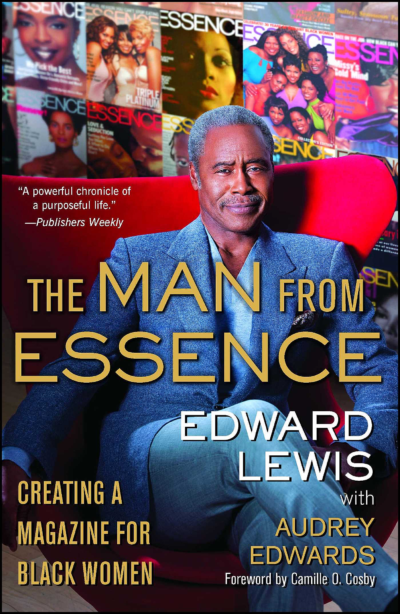
50BOLD: Yes, yes!
Ed: Jonathan Blount raised his hand and said, ‘I’ve had an idea for a magazine for Negro women.’ Then Russell Goings mentioned to Blount, ‘There’s Ed Lewis over there. He knows something about money. Why don’t you two get together at the end of the meeting?’ And after the meeting ended, Cecil Hollingsworth, Tony Janniere, Jonathan Blount, and myself came together. We also met several weeks later, and Clarence Smith joined us.
We called ourselves The Hollingsworth Group because Cecil Hollingsworth had his own graphic design business. And he had stationery with the group name on it.
Tony Janniere worked for The New York Times. Since he was the person who at least knew something about advertising, and publishing, we made him the president of our group.
50BOLD: I see.
Ed: But subsequently, Tony became what I call risk adverse. He had a very good job at The New York Times, and was making good money. It seemed very risky to go out on your own. Running his own business ultimately turned out not to be his cup of tea and he left the group.
50BOLD: Besides the creation of Essence, what would you say has been your proudest achievement?
Ed: In 1994, I was having drinks with a legendary jazz impresario by the name of George Wein. George started the New Orleans Jazz Festival. I was telling him about my upcoming Essence 25th anniversary in 1995. I wanted to do something a little different than just having a great big party in New York City. He said to me, ‘Have you ever thought about doing a music festival in New Orleans over the 4th of July weekend at the Superdome?’ I replied, ‘Nooo, I had not thought about it.’
I began to think maybe George was on to something here. So, I invited him to the Essence office so that he could make a presentation to Clarence Smith (president and advertising director), Susan Taylor (editor-in-chief), and Harry Dedyo (chief financial officer). We sat and listened to George’s presentation. Clarence and Susan felt lukewarm about it. I made the decision to do it.
And to see how that 1995 decision to hold a yearly music festival in New Orleans has blown up to what it is today is mindboggling! Over half a million people come to New Orleans over the 4th of July weekend. And to see all of the seminars that take place at the convention center…Party with a Purpose! The festival is a shared family reunion that gives me a great, great, wonderful feeling that I was able to make this momentous decision as a CEO.
50BOLD: And the festival is still going strong.
Ed: It is still going strong and has been a definite gamechanger. I was way ahead of the times as far as doing music festivals, that are now taking place all over the world. It all makes me feel very, very good.
And I am proud that I sold the company to Time Inc. in 2005. Of the 27 employees, 15 were Black women who had shares in Essence. Those Black women did very well with the sale of the publication.
50BOLD: Did you get any pushback from the decision to sell Essence magazine to Time Inc.?
Ed: Very little. There were a few naysayers. I became involved with Time in 1999, when I was thinking about buying Vibe magazine.
50BOLD: Oh, I didn’t know that.
Ed: Yes, Vibe was the magazine I thought would be a wonderful complement to Essence. Vibe was started by Quincy Jones with the help of Time Inc.
They were interested in being bought; I did try. I was invited to an investment conference to learn how the magazine was doing and to put a bid in. That’s when I got involved with Time Inc. to talk about the possibility of us working together.
Essence and Time came together in 2000 and dated for the next five years. We got to know them, they got to know us. I remember Don Logan, the Chairman/CEO of Time Inc. saying ‘Ed, we have all kinds of possibilities, use what you want, and discard what you don’t want. But use the kind of resources that Time Inc. could provide Essence.’
Logan asked Michelle Ebanks, who was Money Magazine’s financial director and general manager at the time to help lead the acquisition of Essence. I hired Michelle as group publisher and then she became President of Essence.
We struck a deal in which Essence, retained 51% and Time kept 49%. We agreed to come back together in 2005 to continue our negotiation. Fortunately, in 2004, they came to me to ask, if I would sell the remaining 51%. It took us a year to complete that deal and next year, it will be 20 years since it all went down.
50BOLD: Is there going to be a movie or series based on Essence magazine?
Ed: There’s going to be a series inspired by the book I wrote.
50BOLD: Oh, there is?
Ed: The Man from Essence: Creating a Magazine for Black Women, Peacock and Universal are going to do it. We have already found a writer to work on the project.
50BOLD: Oh, I can’t wait. Oh my God, I’m excited!
Ed: It’s going to be part fiction and part factual. I will be a consultant/producer.
50BOLD: Great! Now, what are your current priorities in this season of your life?
Ed: Well, you know, I am bicoastal. I live in New York City and Los Angeles. I serve on several boards. The main corporate board I serve on is the Blackstone Real Estate Income Trust Inc. I’m in a field that’s certainly far away from publishing but definitely in finance, and I’ve gained an appreciation for real estate.
Blackstone is the largest owner of real estate globally; it keeps me busy. And I’m very much involved in several non-profits: the Llewellyn Family Foundation, and the Clara Elizabeth Jackson Carter Foundation. I’m mostly involved with the charter school Harlem Village Academy.
The Harlem Village Academy is very, very important. The whole issue of how we educate our children, particularly Black and Latino kids is very much on the top of my mind. I want to make sure that our infrastructure, our children, have all the basics of reading, writing, and arithmetic. My involvement with a charter school is making that happen. We must educate our children properly.
I was just recently at the United Negro College Fund’s 80th Anniversary gala. I was asked to present the Trailblazer Award to the current President and CEO of Essence Ventures, Caroline Wanga. After I gave my little talk about why Essence should get the Trailblazer Award; I said a few words about the upcoming election:
‘I would hope everyone votes and let me just say this. Regarding one of the candidates who said, that if he doesn’t get elected, there would be a bloodbath in the streets. I want Donald Trump to have a bloodbath at Mar-a-Lago.’
50BOLD: (Laughs)
Ed: I went on to say, ‘Make sure he does not get elected. That would be an absolute disaster.’
50BOLD: Absolutely! And speaking of politics, did you ever consider running for political office?
Ed: I did! I did think about it. Karen, I thought that if I did run for office, I was going to say out front, ‘I did everything you think I did and then some!’ (laughs) When you step out there in the public eye, particularly now with social media, they have everything on you that they can think of!
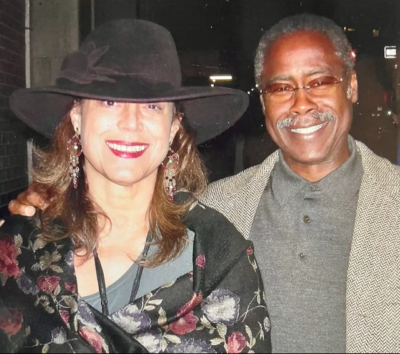
50BOLD: Yes, yes, and YES!
Ed: They try to find out about something that can tarnish who you are. I did everything you think I did. That never came to be, but I do believe that we need to be with coalitions that agree with our desire for better jobs, better opportunities, and better education. We helped build this country. We should be a part of all the goodies this country can afford us.
And this issue of diversity, inclusion, and equity, I find it rather remarkable that some people don’t want to know our history.
50BOLD: Switching gears… How long have you been married to your wife Carolyn? As a matter of fact, I remember when you got married.
Ed: We met in 1986 and married in 1991. It’s 33 years of marriage and we’ve known each other for 38 years. When we first came together, we were always bicoastal. She lived in Los Angeles, and I was here in New York City.
During the pandemic we were together in Los Angeles for two years. It was the first time we were together at the same time, and in the same place for two years. Fortunately, we still like and love each other!
50BOLD: How wonderful! What is the main ingredient that keeps your marriage going strong?
Ed: It’s respect. It’s compromise and you work at it; you don’t take anyone for granted. During my first marriage I didn’t have any children. But when Carolyn and I came together, she already had two daughters. I was able to be a parent. It’s been an extraordinary eye-opener as far as what it means to be a parent. My wife is there for me, has my back, and she gives me wonderful advice. She’s an extraordinary woman, extremely intelligent, strong, very articulate, fearless, thinks out of the box, so, we’ve been hanging in there for all these years.
50BOLD: You have an amazing legacy. How would you like to be remembered?
Ed: I would like to be remembered as a man who listened to his mother when she said, ‘I want you to try and do the right thing!’ I remember in 2007, I was staying at a New Orleans hotel. I was having breakfast and spotted this Black woman staring at me. She came over to me and said, ‘Are you Ed Lewis?’ I said, ‘Yes, I am.’ She said, ‘I’m 47 years old and from Mobile, Alabama. I just want to thank you for bringing Essence into the world. You have no idea what you have done for me. And for many millions of Black women. I just want to thank you!’
50BOLD: Touching!
Ed: I want to be remembered as someone who helped bring something into the world that has made a difference. That made life a little bit better as we navigate in this world.
50BOLD: Is there something about you that most people don’t know?
People see you as very professional, and very reserved. Is there another side of you?
Ed: Yes, I’m a frustrated Blues singer.
50BOLD: Really?
Ed: Yes!
50BOLD: I can almost hear you singing the blues.
Ed: Yes, I can say that honestly, I am a frustrated Blues singer.
My dad was a janitor at City College and I used to help him clean. I thought being a janitor was really hard work. At City College there was a big amphitheater called the Lewisohn Stadium which is where the jazz promoter George Wein, who later founded the Newport Jazz Festival promoted concerts. My dad sneaked me into many of those concerts. I saw Duke Ellington, Miles Davis, Dizzy Gillespie, John Coltrane, and incredible jazz artists who became a part of who I am.
And the Blues was always playing in my house, B.B. King, Bobby Blue Bland and the likes.
50BOLD: Can you sing?
Ed: I think I can sing. (laughs) When I first went to the University of New Mexico in 1958, the university had 8,000 students, there were only 12 Black students. What we would do is have Ray Charles parties which helped to keep us together. We listened to Ray Charles because there was such a magnetic force in the kind of music he made.
50BOLD: So, all of you would sing at the parties.
Ed: No doubt about it!
50BOLD: Oh, wow! Now, that’s a story.
Ed: In 2003, my good friend Tom Burrell gave me a birthday gift which was to play some Blues on WBGO Radio here in New York City. It was a great hour of my selecting blues artists. I still have the radio recording to this day.
50BOLD: Wow, that was a wonderful gift!
Ed: Yes, it was. I love singing the blues. I love music, people may not know this about me.
50BOLD: Do you have a secret daily pleasure?
Ed: A secret daily pleasure? I like to walk. When I’m here in New York City, I walk. I find walking meditative. It’s very helpful to have the ability to talk to yourself and solve problems, while at the same time, getting in some movement which is very important.
I am thinking about the possibility of doing a book about giving advice to Black men about the importance of taking care of themselves. I go to the Mayo Clinic. I’ve been going to the Mayo Clinic in Rochester, Minnesota since 1995.
In 1988, I had a single cardiac artery bypass that changed the focus of my life. My doctor said to me, ‘Ed, I’d like you to think about being on a low cholesterol, low sodium diet for the rest of your life.’ I thought about what my doctor advised, and decided, if there are certain kinds of foods that may be injurious to my health, I would no longer deal with them. I have not had a piece of beef or pork since 1988.
I eat skinless chicken, fish, and try to maintain this kind of diet because I don’t know how long I’m going to be on this earth. I am not going to make a contribution to leaving it by eating the kinds of foods I know are not good for me.
50BOLD: That makes a lot of sense.
Ed: That makes a lot of sense. I would encourage us all to do a great deal more walking, it’s just more helpful.
50BOLD: Last question, when you get to the gates of heaven what will God say to you?
Ed: ‘Ed, job well done!’


